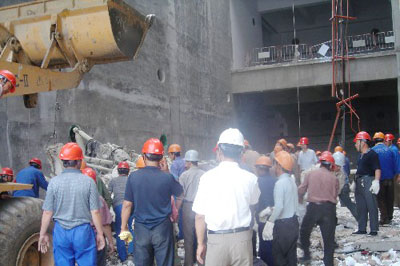The cabinet, in an unusually tough message, has warned regional officials
that any attempt to dilute the effects of macro-economic policies would not be
tolerated.
At an executive meeting chaired by Premier Wen Jiabao yesterday, the State
Council sternly reprimanded top officials in the Inner Mongolia Autonomous
Region for their role in an unauthorized project which caused fatal accidents.
The region's chairman, Yang Jing, and vice-chairmen Yue Fuhong and Zhao
Shuanglian, were ordered to write self-criticisms to the State Council.

Rescuers work at the
site of a collapse at the Xinfeng Power Plant, illegally under
construction, in this July 8, 2005 photo. Six were killed and eight
injured in the collapse accident.
[Xinhua] |
The illegal project was Xinfeng Power Plant with an investment of 2.88
billion yuan (US$$350 million) designed to consist of two coal-burning
generators with a capacity of 300,000 kilowatts each. Construction started in
April 2004 without requisite approvals.
The State Council's tough stance comes amidst Beijing's intensified efforts
to curb excessive growth in fixed asset investment to avoid an overheated
economy.
The government of the Inner Mongolia Autonomous Region was criticized for
failing to implement the central government's macro-economic control measures,
according to the Xinhua News Agency.
An investigation by the National Development and Reform Commission and the
Ministry of Supervision found a multitude of irregularities in the project.
Seven other officials were also disciplined, and another two face
prosecution.
On July 8 last year, an ill-advised decision to speed up the unauthorized
project led to the collapse of one of its main structures and the deaths of six
workers. Eight were injured.
"The investigation found that local government departments and enterprises
exceeded their authority in approving the project. They illegally approved land
use, filed false reports and did not follow proper bidding procedures," Xinhua
said.
Construction of the power plant continued even after State departments deemed
it illegal and ordered a stop.
It is a typical example of ignoring laws and procedures that has grave
consequences, the report said.
The regional government was also accused of approving the construction of
other power plants with a generation capacity of 8.6 million kilowatts in
violation of rules.
The cabinet meeting ordered a halt to construction of all the illegal power
plants in the region, the report said, and asked all local governments and
departments to learn a lesson from the incident and implement all macro-economic
control measures.
"Anyone who disobeys the orders will be held accountable," the meeting
warned.
This is the latest call from the central government to tighten macro-economic
controls over the country's blistering economy, which recorded a growth of 10.9
per cent in the first half of this year.
In another development, four major power-generating companies were among a
large number of big corporations which have been penalized by the organization
in charge of enterprises under central government control.
Datang, Huadian, Zhongdian and the State Grid Corporation paid out large
amounts of unauthorized housing allowances, Li Rongrong, minister of the State
Administration of State-owned Assets Commission, said on Tuesday.
Fixed asset investment growth slowing down
Growth in fixed asset investment slowed down last month as government
measures to rein in the economy began to bite.
Urban fixed asset investment from January to July rose 30.5 per cent
year-on-year to 4.48 trillion yuan (US$560 billion), compared to the annualized
growth of 31.3 per cent in the first half of the year, the National Bureau of
Statistics (NBS) said yesterday.
It did not give specific figures for July, but Ma Qing, a macro economy
analyst at CITIC Securities, said the decline in the month's growth rate was
significant.
Growth in July was only around 27.4 per cent from a year ago, while it was 33
per cent the previous month, said Ma.
Investment growth seemed to have peaked in June, he said, and the latest
figures indicate an obvious slowdown.
"It means the macro-control measures have started to take effect," he said.
"And that means less risk to the economy."
Rapid investment growth and concerns of a potential overheating in the
economy have forced the central government to adopt a series of measures to cool
down investment and lending since the end of April.
They include a lending-rate hike and higher reserve requirements for
commercial banks twice within two months, in addition to other credit curbs and
land control measures. The authorities also set a higher threshold for new
construction projects.
Ma estimated that annual growth in fixed asset investment would be 27-28 per
cent based on the present trend.
Real estate investment in the first seven months grew by 24 per cent from a
year ago to 941.1 billion yuan (US$117.6 billion) compared to 24.2 per cent in
the first six months, according to NBS statistics.
Investment in coal mining rose 42.5 per cent during the January-July period,
compared to 45.7 per cent in the first half. But suppliers of power, heat,
petrol and natural gas saw a slight investment increase in July.
Industrial output also grew at the slowest pace in July since April,
according to NBS statistics.
Experts said the government might still adopt more tightening measures in the
coming months to consolidate the economy and prevent overheating.
The central bank remains worried about mounting inflationary pressure and
growing money supply.
The M2, the broad measure of money supply, maintained rapid growth in July,
rising 18.4 per cent year-on-year, 2.1 percentage points higher than that the
same period a year ago.
Outstanding renminbi loans also grew by 16.3 per cent at the end of July, 3.2
percentage points higher than a year earlier.
(China Daily 08/17/2006 page1)